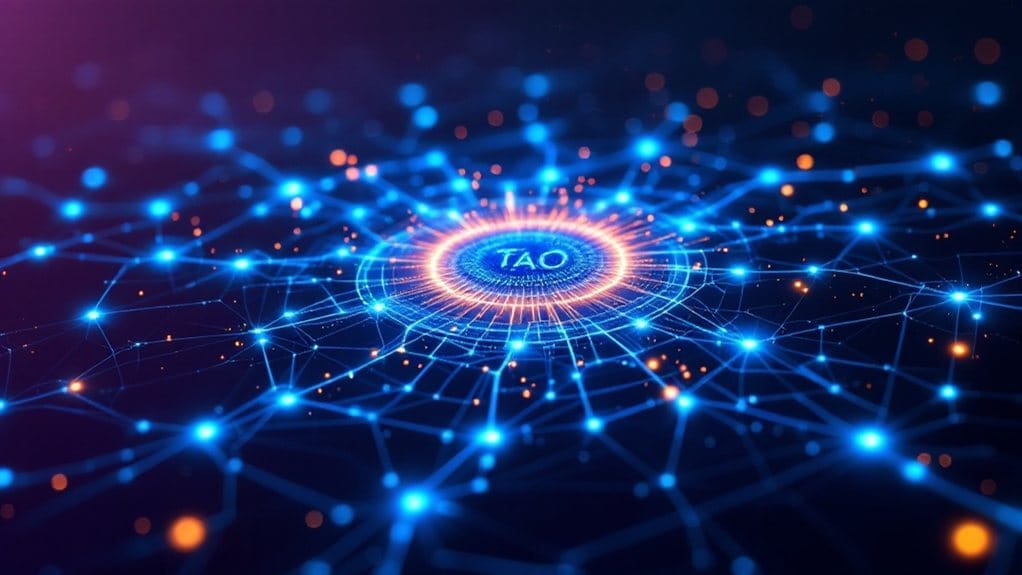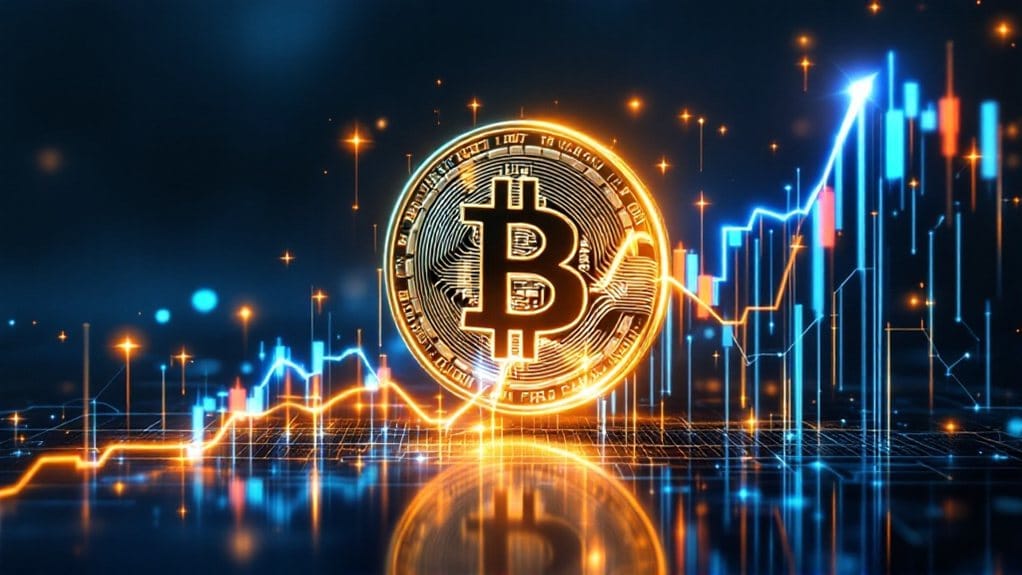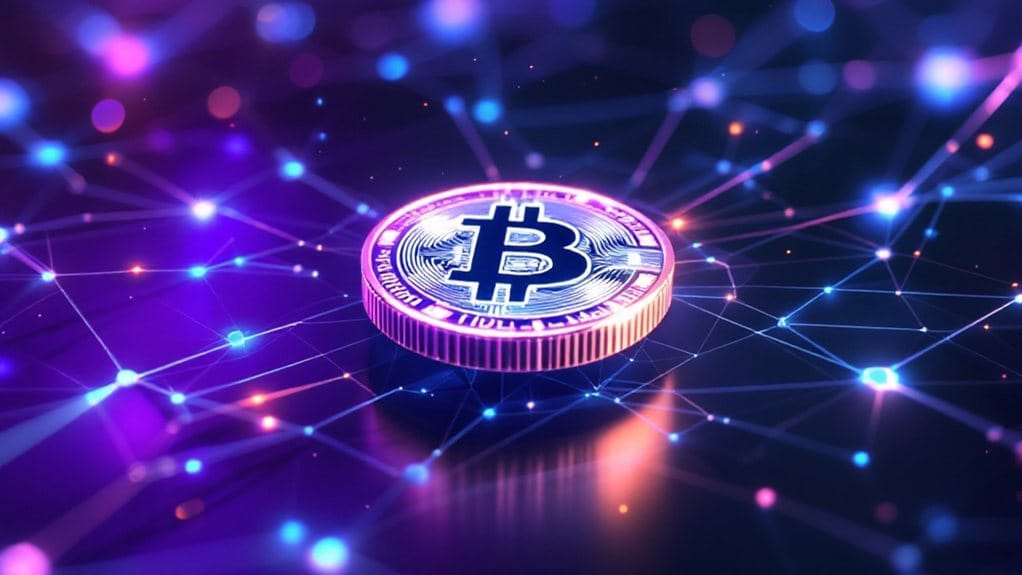TAO operates as an innovative DeFi protocol within the Bittensor ecosystem, combining artificial intelligence with decentralized finance through its native cryptocurrency. The protocol utilizes a Proof of Intelligence consensus mechanism where miners contribute computational resources for AI tasks, while validators verify output quality across neural network-like subnets. With a fixed supply cap of 21 million tokens, TAO implements multi-layered incentivization, community governance, and DeFi integration through TAO.BOT, establishing a framework that transforms traditional AI monetization. This extensive system offers insights into the future of decentralized artificial intelligence.

While the cryptocurrency landscape continues to evolve rapidly, TAO has emerged as a pioneering protocol that bridges the domains of artificial intelligence and decentralized finance. Operating within the Bittensor ecosystem, TAO serves as the native cryptocurrency that powers a sophisticated network of AI-driven applications, reward systems, and governance mechanisms, with a fixed supply cap of 21 million tokens modeled after Bitcoin’s tokenomics.
The protocol’s architecture relies on a unique Proof of Intelligence consensus mechanism, where miners contribute computational resources to perform AI tasks and validators verify the quality of outputs across different subnets. These subnets function analogously to neural networks, creating a decentralized AI infrastructure that promotes collaboration while reducing the redundancy typically associated with centralized AI development. The system implements regular security audits to maintain the integrity of network operations. The platform ensures complete asset control through smart contracts, eliminating the need for traditional financial intermediaries.
TAO’s Proof of Intelligence mechanism enables distributed AI computation while eliminating redundancies through subnet-based validation and neural network principles.
Through TAO.BOT, the protocol’s DeFi integration layer, users can seamlessly convert external assets like ETH and USDC into TAO, accessing a robust swap engine for trading operations and staking opportunities. Similar to established DeFi platforms like Uniswap and MakerDAO, TAO implements a governance token system for community-driven decision-making.
The ecosystem’s effectiveness stems from its multi-layered approach to incentivization, where participants receive TAO tokens based on their contributions’ value and accuracy. Miners earn rewards for completing complex AI tasks, while validators stake tokens to participate in the network’s consensus process, creating a self-sustaining economy that promotes both growth and security.
The Bittensor API facilitates seamless interaction between these components, enabling efficient communication between subnets and the underlying blockchain infrastructure.
TAO’s implementation represents a significant shift away from traditional centralized AI development models, offering cost-effective solutions through its decentralized architecture. The protocol’s governance system empowers token holders to shape its evolution through proposal and voting mechanisms, promoting community-driven development.
This thorough approach to combining AI capabilities with DeFi functionality has positioned TAO as a leading protocol in the rapidly expanding intersection of artificial intelligence and blockchain technology, demonstrating the potential for decentralized systems to transform both fields simultaneously.
FAQs
What Are the Risks Associated With Investing in TAO Tokens?
Investing in TAO tokens involves several critical risks: market volatility can lead to substantial price fluctuations, while regulatory uncertainties pose compliance challenges.
Cybersecurity threats and software vulnerabilities may compromise the token’s stability, and competition from established AI platforms could affect market position.
Furthermore, the protocol’s limited operational history, combined with potential forging risks and governance uncertainties, creates heightened investment exposure that requires careful consideration.
How Does Tao’s Governance System Allow Token Holders to Participate?
TAO’s governance system allows token holders to participate through multiple mechanisms: staking tokens to become validators, submitting protocol improvement proposals, and exercising voting rights on key decisions.
Token holders can engage in on-chain voting, where voting power correlates with their token holdings, and they may delegate their voting rights to other participants.
The system guarantees decentralized decision-making through transparent, verifiable processes on the blockchain.
Can I Stake TAO Tokens With Hardware Wallets?
Hardware wallets can store TAO tokens securely but don’t support direct staking functionality within the device.
Users must connect their hardware wallets to external platforms like Taostats Staking Dashboard to participate in staking. This process involves linking the hardware wallet to compatible software interfaces while maintaining the security benefits of cold storage.
This allows users to delegate their tokens to validators and earn rewards every 12 moments.
What Makes TAO Different From Other Defi Yield Farming Protocols?
TAO differentiates itself from traditional DeFi yield farming protocols through its unique Proof of Intelligence consensus mechanism and AI-focused marketplace.
Unlike conventional protocols that generate yields through lending or liquidity provision, TAO rewards participants based on their AI model contributions and innovations.
The protocol’s decentralized AI network enables users to stake tokens while participating in machine learning development, creating a distinct ecosystem where rewards align with intellectual contributions rather than merely capital deployment.
Are There Geographic Restrictions for Participating in the TAO Protocol?
While TAO Protocol is technically accessible globally through the internet, participants must comply with their local jurisdictions’ regulations regarding DeFi activities.
Some countries may impose restrictions or require specific licenses for cryptocurrency-related services, including yield farming protocols.
Users should verify their local laws, as regulatory frameworks for DeFi vary considerably across different regions and continue to evolve with the expanding digital finance landscape.









